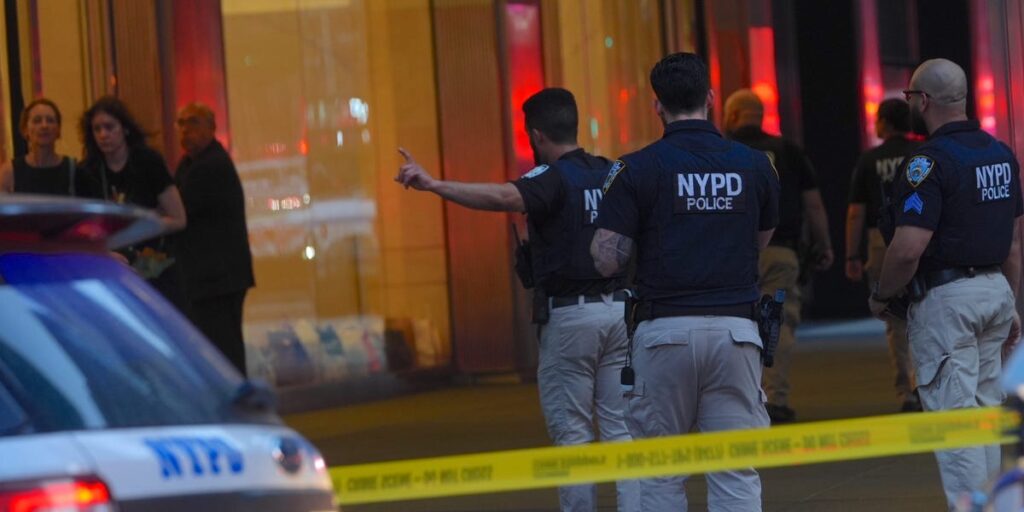Corporate America is on guard.
A deadly shooting at a New York City office tower on Monday has companies and executives boosting security across Wall Street and corporate America. Firms are scrambling to hire armed guards, conduct risk assessments, review security protocols, and reassure employees that they’re safe, security experts said on Tuesday.
“The phone hasn’t stopped since this morning,” Sean Crowley, the cofounder and CEO of CTS Research and Investigations, told Business Insider. CTS, based in NYC, is a partner and co-owner of Illuno, an app — “Like Uber for hiring security guards,” Crowley calls it — that makes it easy to hire law enforcement for security jobs.
Most of the calls, Crowley said, are coming from commercial and office property managers in Manhattan and downtown Brooklyn who want to bring in armed security guards, clad in suits and ties, to post in their lobbies. “This will more than double our workload,” said Crowley, a former NYPD captain and commander of the Manhattan District Attorney’s Office detective squad.
Corporate leaders are on edge after the second deadly shooting involving business executives in six months. Monday’s attack, which played out at the New York City headquarters of the private equity firm Blackstone, left five dead, including real estate executive Wesley LePatner and the gunman. Monday’s shooting followed the assassination of UnitedHealthcare CEO Brian Thompson in December. Companies are now rushing to reassure staff and bolster security as haunting images—like barricaded office doors—underscore growing fears that working for corporate America is no longer safe.
Don Aviv, president of Interfor International, a security firm that works with asset managers, told BI on Tuesday that roughly 80% of his firm’s clients had “retained additional security for their lobbies and foyers,” with some hiking protective services through next week.
“The issue with our society is that we’re reactionary and not proactive,” Aviv said.
Heightened security comes at a cost
Banks like Goldman Sachs and Citi sought to assuage employees about workplace security on Tuesday.
Goldman Sachs “has robust protocols in place to keep our people safe every day, and is proactively assessing and monitoring the safety of the firm’s global campuses to protect our people and facilities around the clock,” Goldman said in a memo authorised by Jacqueline Arthur, head of human capital management and corporate and workplace solutions.
“This includes our dedicated team of NYPD officers and security guards at the entrance of and within our buildings, who are trained to carefully manage entry to our offices and respond to any potential incident,” Arthur said, adding that Goldman “is constantly assessing” its security protocols.
Citi told New York-based employees on Tuesday that the firm had “increased the security presence and capabilities at our headquarters” within the past year. “This includes working closely with the NYPD,” he said. “While we feel confident with the protocols we have in place, we will not hesitate to adjust if necessary,” said the memo by Ed Skyler, Citi’s head of enterprise services and public affairs.
For companies seeking to boost security, the extra layer of protection won’t come cheap. Two security executives in New York City say posting an armed former or off-duty police officer in your lobby will cost building managers $75 to $200 an hour or more. Hiring an armed escort to protect a CEO or other prominent person will cost in the $135 to $200 range per hour.
For now, it’s not prohibiting demand. Herman Weisberg said his security company usually hires about 15 armed former military and NYPD officers to protect CEOs and other high-profile individuals in New York and Washington, DC. On Tuesday, that number was up to 30 — and the managing director of SAGE Intelligence thinks it will grow further.
Weisberg, a former NYPD detective, said he is also seeing an increase in requests for “threat assessments,” including risks tied to former disgruntled ex-employees.
“One firm,” he said, “wants us to work with their customer service department on analyzing current people who are complaining ‘outside the norm.'”
He pointed to the back-to-back tragedies of the fatal shooting of UnitedHealthcare’s CEO, followed by Monday’s attack.
“When this stuff happens more than once, I think anybody with controversial or, at this point, even non-controversial businesses are starting to look at security and take it a little bit more seriously.”



